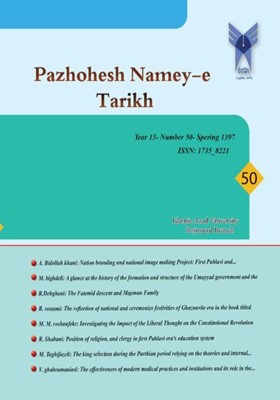The effectiveness of modern medical practices and institutions and its role in the development of modern medicine in Qajar era
Subject Areas : Epistemological and methodological researcher of historical researchvaliulah qahremani asl 1 , Mir Asadolah Salehi Panahi 2 , Naser Sedqi 3 , Shahrzad Sasanpur 4
1 - PhD student of history. Islamic Azad University Shabestar. History
2 - Assistant Professor of Islamic Azad University, Shabestar, Iran
3 - Associate Professor of the History Department of Tabriz-Iran
4 - Assistant Professor of Islamic Azad University, Shabestar, Iran
Keywords: ", Health institutions ", , ", development of modern medicine", , ", traditional medicine", , ", Qajar era", ,
Abstract :
Several factors were involved in the development of modern medicine in Qajar era. This research method is documents and library. We use set of medical factors in scientific websites and also collected documents and books and using descriptive and analytical method in trying to answer this question: What medical factors involved in the development of modern medicine and led to its prevalence in society are the Qajar era? The following hypothesis were made in response: Since the medical issues associated with health and replace modern medicine instead of traditional medicine in most cases, the health and vitality of people seemed guarantee so effective in changing people's view of modern medicine and has been pivotal. In this context, the impact of medical factors such as: Institutions of medical, health and education, not meeting people's expectations of traditional medicine, education of medicine in new ways, the application of modern scientific methods by foreign doctors in treating patients and legalization of medicine in development of modern medicine were studied. The following results were obtained in addition to the above legalization of medical affairs was effective in sustainability and continued use of the latest achievements of modern medicine.
_||_


